Related Research Articles
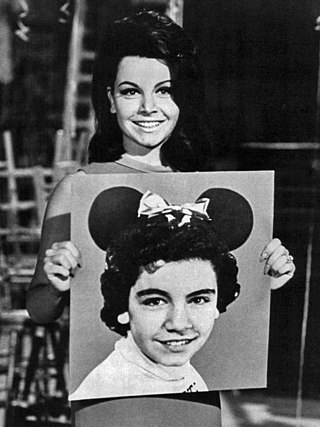
Annette Joanne Funicello was an American actress and singer. She began her professional career at age 12, becoming one of the most popular Mouseketeers on the original Mickey Mouse Club. In her teenage years, Funicello had a successful career as a pop singer recording under the name "Annette". Her most notable singles are "O Dio Mio", "First Name Initial", "Tall Paul", and "Pineapple Princess". During the mid-1960s, she established herself as a film actress, popularizing the successful "Beach Party" genre alongside co-star Frankie Avalon.
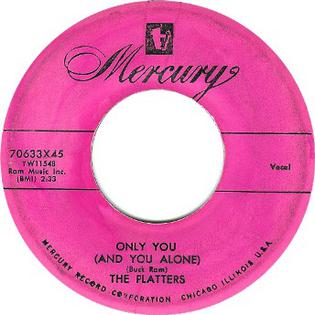
"Only You (And You Alone)" (often shortened to "Only You") is a pop song composed by Buck Ram. It was originally recorded by The Platters with lead vocals by Tony Williams in 1955.

"You Don't Know Me" is a song written by Eddy Arnold and Cindy Walker in 1955. "You Don't Know Me" was first recorded by Arnold that year and released as a single on April 21, 1956, on RCA Victor. The best-selling version of the song is by Ray Charles, who took it to number 2 on the Billboard Hot 100 chart in 1962, after releasing the song on his number 1 album Modern Sounds in Country and Western Music. The first version of the song to make the Billboard charts was by Jerry Vale in 1956, peaking at number 14 on the pop chart. Arnold's version charted two months later, released as an RCA Victor single, 47–6502, backed with "The Rockin' Mockin' Bird", which reached number 10 on the Billboard country chart. Cash Box magazine, which combined all best-selling versions at one position, included a version by Carmen McRae that never appeared in the Billboard Top 100 Sides listing.

"Runaway" is a number-one Billboard Hot 100 song made famous by Del Shannon in 1961. It was written by Shannon and keyboardist Max Crook, and became a major international hit. It topped the Billboard charts for four consecutive weeks, and Billboard ranked it as the No. 5 song for 1961. It was No. 472 on the 2010 version of Rolling Stone's list of the 500 Greatest Songs of All Time and No. 466 on the 2004 version.

"My Boyfriend's Back" is a hit song in 1963 for the Angels, an American girl group. It was written by the songwriting team of Bob Feldman, Jerry Goldstein and Richard Gottehrer. The track was originally intended as a demo for the Shirelles, but ended up being released as recorded. The single spent three weeks at No. 1 on the Billboard Hot 100 chart, and reached No. 2 on the R&B Billboard.
"Mountain of Love" is a song written by Harold Dorman. Dorman released his version as a single in 1960. It was originally recorded in late 1959 at the Royal Recording Studios in Memphis before the backing vocals were overdubbed. It performed well, spending 19 weeks on the Billboard Hot 100 chart, peaking at No. 21 in May 1960, while reaching No. 7 on the Billboard Hot R&B Sides chart, and No. 25 on Canada's "CHUM Hit Parade". The song was his only top forty hit on the Billboard Hot 100 and was the highest-charting single of his career.
"Hey Paula" is an American love song recorded by the pop singing duo Paul & Paula in 1962. Released as a single, it hit number one on the Billboard Hot 100 in the week ending February 9, 1963, and also made it to number one on the Hot R&B Singles chart, and number one in Canada's CHUM Chart for three weeks. "Paul" was the song's writer, Ray Hildebrand, a student at Texas' Howard Payne University, a Baptist institution in the city of Brownwood. "Paula" was Jill Jackson, the niece of the owner of the boarding house where Ray lived.

"Everybody's Somebody's Fool" is a song written by Jack Keller and Howard Greenfield that was a No. 1 hit for Connie Francis in 1960. A polka-style version in German, "Die Liebe ist ein seltsames Spiel", was the first German single recorded and released by Connie Francis, and it reached No. 1 on the single chart in 1960 in West Germany.
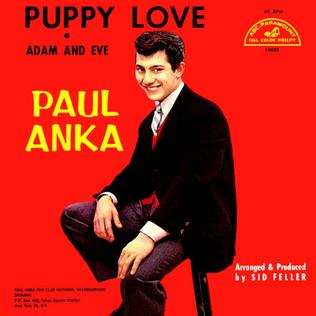
"Puppy Love" is a popular song written by Paul Anka in 1960 for Annette Funicello, a Mouseketeer, whom he had a crush on. Anka's version reached No. 2 on the Billboard Hot 100 behind Percy Faith's "Theme from A Summer Place", No. 4 on the Canadian CHUM Charts, and No. 33 on the UK Singles Chart.
"Tall Paul" is a song recorded by Annette Funicello and written by the Sherman Brothers, along with Bob Roberts.
"Pineapple Princess" is an American pop song made popular by Annette Funicello in the summer of 1960. "Pineapple Princess" was written by the Sherman Brothers. It appeared on the LP album Hawaiiannette.
"You're Nobody till Somebody Loves You" is a popular song written by Russ Morgan, Larry Stock, and James Cavanaugh and published in 1944. The song was first recorded by Morgan and was a hit for him in 1946, reaching the No. 14 spot in the charts. The best known version was Dean Martin's, which was released in 1960 and reissued in 1964.
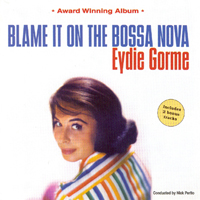
"Blame It on the Bossa Nova" is a song written by Cynthia Weil (lyrics) and Barry Mann which was a 1963 hit single for Eydie Gormé, reaching number 7 on the Hot 100 in Billboard in March 1963. The song also peaked at number 32 in the UK, whereas "Yes, My Darling Daughter" became the biggest hit for Eydie there, reaching number 10.
"He'll Have to Go" is an American country and pop hit recorded on October 15, 1959, by Jim Reeves. The song, released in the fall of 1959, went on to become a hit in both genres early in 1960.
"California Sun" is a rock song first recorded by American rhythm and blues singer Joe Jones. Henry Glover is credited on the original 45 rpm single as the songwriter, although Roulette Records owner Morris Levy's name sometimes incorrectly appears on re-issues. In 1961, Roulette issued the song with "Please Don't Talk About Me When I'm Gone" as the B-side. The single reached number 89 on Billboard's Hot 100.
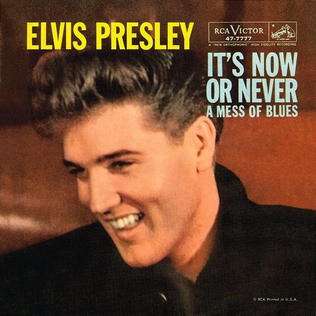
"It's Now or Never" is a song recorded by Elvis Presley and released as a single in 1960. The song is one of the best-selling singles by Presley, and one of the best-selling physical singles of all time. It was recorded by Bill Porter at RCA Studio B in Nashville. It is written in E major and has a tempo of 80 BPM.

"Roses Are Red (My Love)" is a popular song composed by Al Byron and Paul Evans. It was recorded by Bobby Vinton, backed by Robert Mersey and his Orchestra, in New York City in February 1962, and released in April 1962, and the song was his first hit.
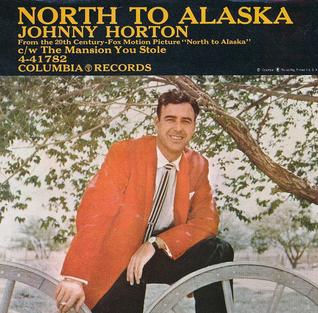
"North to Alaska" is a 1960 hit song recorded by Johnny Horton that was featured in the movie of the same name. The song was written by Mike Phillips, along with Tillman Franks. Though Horton had sung several popular movie tie-in songs, this was the first one that was sung over the opening titles. Horton died in an automobile accident November 5, 1960 two days before the movie was released. Members of the Western Writers of America chose it as one of the Top 100 Western songs of all time.
"Last Date" is a 1960 instrumental written and performed by Floyd Cramer. It exemplifies the "slip note" style of piano playing that Cramer made popular. It peaked at number 11 on the country chart and at number two on the Hot 100 behind "Are You Lonesome Tonight?" by Elvis Presley. Cramer's recording inspired a number of successful cover versions, including a vocal adaptation by Conway Twitty.
"Cradle of Love" is a song released in 1960 by Johnny Preston written by Jack Fautheree & Wayne Gray.
References
- ↑ "Annette Funicello - O Dio Mio Lyrics | Genius Lyrics". Genius .
- ↑ "Billboard Hot 100 - May 9, 1960". Billboard .
- ↑ "CHUM Chart results". Archived from the original on February 8, 2006.
- ↑ "Billboard - January 25, 1960" (PDF). Billboard .